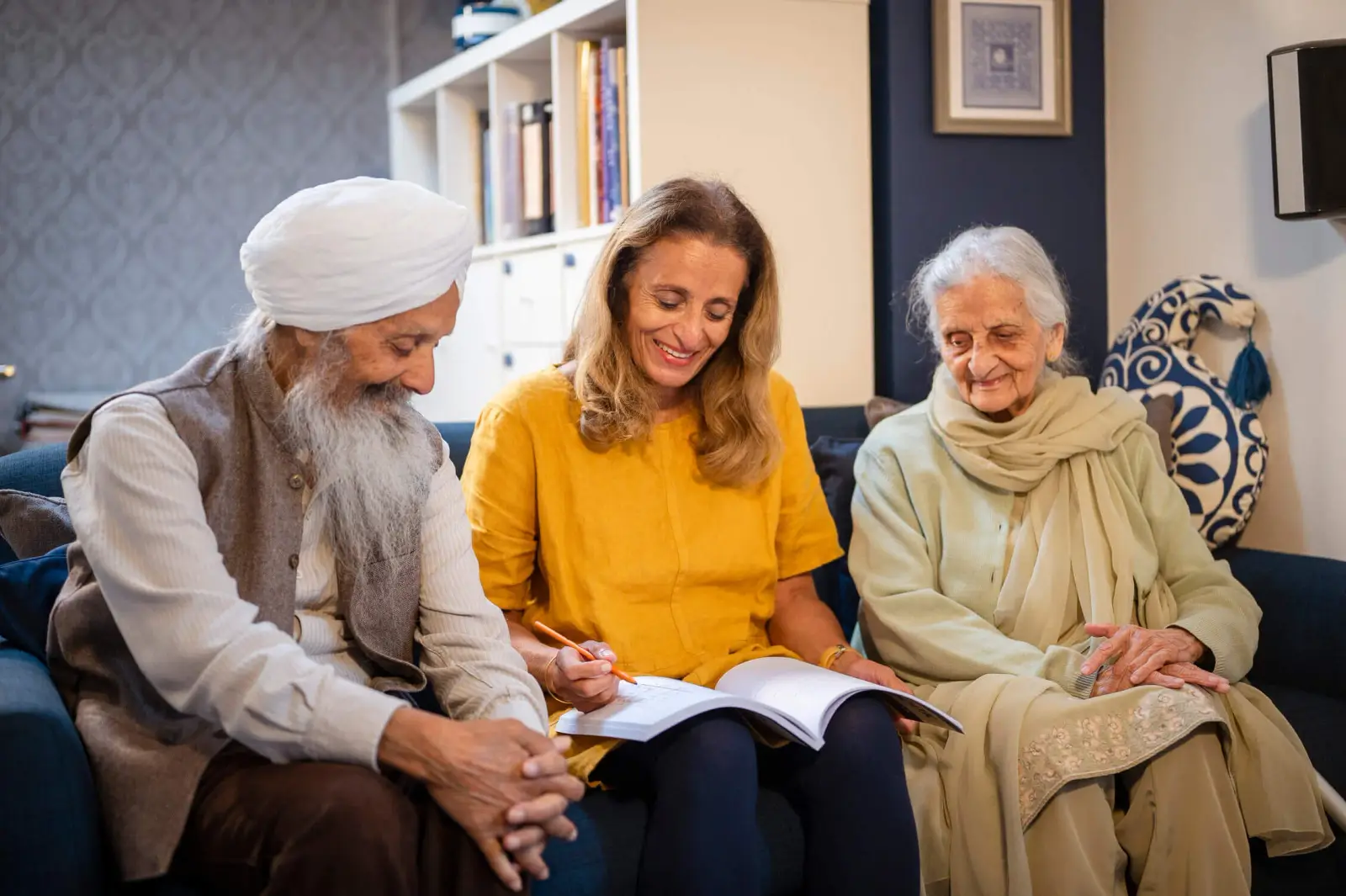Live-in dementia care
Dementia care at home offers familiar surroundings and personalised support. With Elder, you can arrange trusted live-in dementia care tailored to your loved one’s needs. Watch Sue's video or read how dementia care made all the difference.
Find a carerCall us6,000+ Carers
Select from over 6,000 qualified carers
Fast matching
Care can begin in as little as 24 hours
Across Great Britain
We have organised care in every GB postcode
Cost efficient
Costs on average 35% less than traditional services

What is dementia care?
Dementia care is a form of specialist support designed to help people with dementia live as safely, comfortably, and independently as possible. It refers to caring for all types of dementia – including Alzheimer’s, Lewy Body dementia, vascular dementia, frontotemporal dementia, and mixed dementia – at every stage of the condition.
From early signs like confusion and memory loss to more advanced symptoms such as wandering or difficulty eating, dementia care provides tailored support to meet a person’s changing needs.
Experienced dementia carers use techniques like reminiscence therapy, routine-building, nutritional support, and help with challenging behaviours such as sundowning to improve quality of life and wellbeing.
When is dementia care needed?
There’s no set moment when dementia care must begin, but certain signs can help you recognise when extra support might be needed.
Signs it might be time
You may want to consider dementia care when:
- Daily tasks like eating, dressing, or taking medication are being forgotten
- Wandering, confusion, or disturbed sleep are causing safety concerns
- Care at home is becoming difficult to manage
- You’re feeling overwhelmed or exhausted as a caregiver.
Getting the right support
Dementia care doesn’t always mean moving into a care home — many people remain comfortable at home with visiting or live-in carers. The best time to start care is when it improves life for everyone involved.
Tip: Early support can reduce stress and help your loved one stay independent for longer.
We’re here to help
With the right care, it’s possible to live well with dementia. If you’re unsure what kind of support is right, our care advisors can guide you through your options and help you plan for the future.
Call Us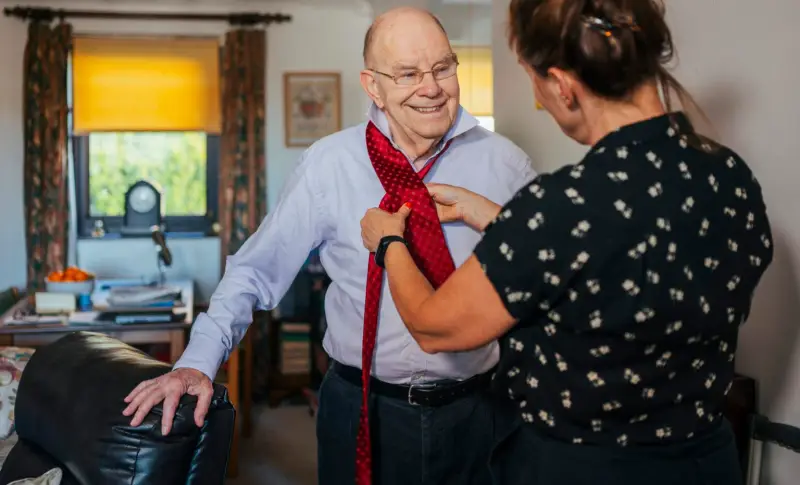
Types of dementia care we offer
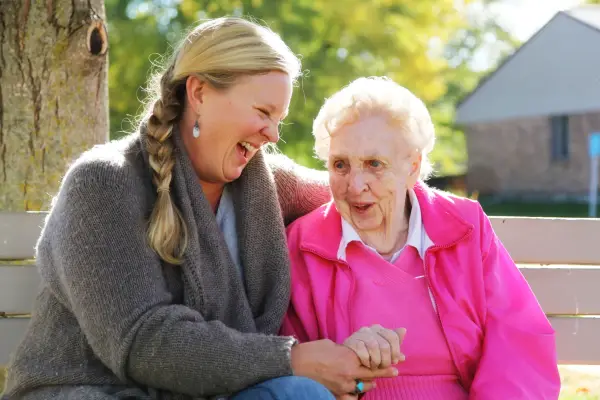
Live-in dementia care
- A carer moves in with your loved one to support them 24/7
- Personalised care tailored to dementia symptoms and routines
- Ideal for those needing consistent, one-to-one supervision
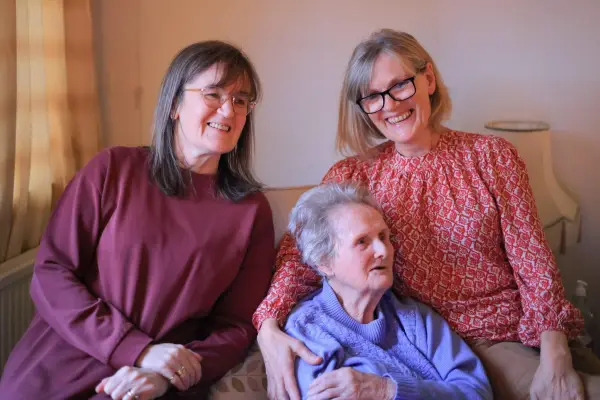
Dementia hourly care
- Flexible, hourly-based care in the comfort of your home
- Help with daily tasks like meals, medication, or companionship
- Best suited for early-stage dementia and part-time support
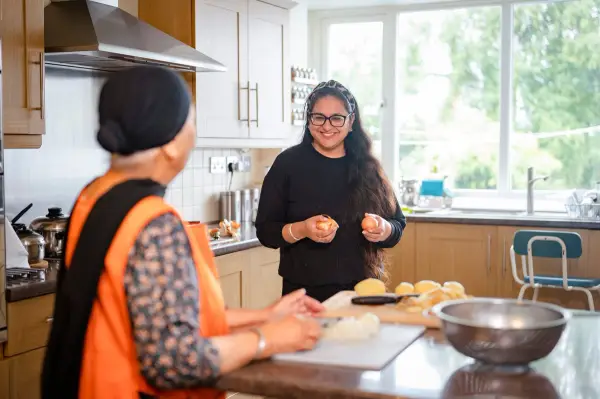
Dementia respite care
- Short-term cover while the primary carer takes a break
- Professional, reassuring support for the person with dementia
- Helps prevent carer burnout and maintain quality of care
Why choose live-in dementia care?
Live-in dementia care allows your loved one to remain in the comfort and familiarity of their own home, with a dedicated carer providing round-the-clock support. It’s a highly personalised and compassionate alternative to care homes – one that can significantly improve quality of life, safety, and wellbeing.

How does live-in dementia care work?
Live-in dementia care provides one-to-one support in the comfort of home. A carefully matched professional carer moves into the home to offer personalised, round-the-clock care that helps your loved one maintain their independence and daily routines – all while staying safe and supported.
It’s a popular option for people in the early to middle stages of dementia who may not yet need a care home, but still require dedicated, consistent support.
A personalised approach to dementia care
At Elder, live-in care is tailored to the individual. Most people are supported by one or two carers who work on a regular rotation (e.g. four weeks on, two weeks off). This consistency helps build trust and avoids the confusion that can come with multiple care staff.
Each carer is required to have previous experience supporting people with dementia, and undergoes full background checks. Wherever possible, we match carers based on shared interests and personality to encourage a warm, long-lasting relationship.
Live-in dementia care: Real stories of staying home
When dementia progresses, familiar surroundings can make all the difference. Discover how families have used live-in dementia care to bring reassurance, routine, and peace of mind.
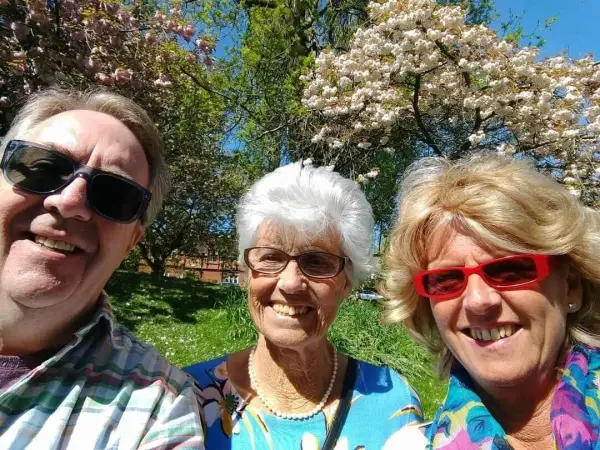
How Sue found relief with live-in dementia care for her mum
Sue shares how dementia care helped her mum stay safe and happy in her own home. This allowed Sue to stop being a carer and become a daughter again, providing her with immense peace of mind.
Read Sue's story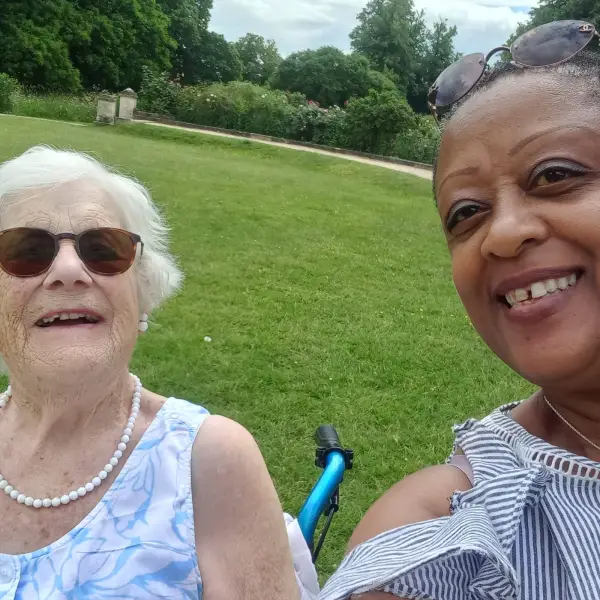
How live-in Alzheimer's care helped Pat stay safe
Penny discusses her mum's experience with Alzheimer's, highlighting why live-in care was the crucial choice for her safety, happiness, and continued quality of life.
Read Penny's story
How do I arrange dementia care with Elder?
Share your care request
Tell us your care requirements using our request form, including the type of care you’re looking for, any specialist skills you need, and what daily life looks like.
Select your carer
You’ll start receiving profiles of suitable self-employed carers within 24 hours. Chat to them online or arrange a phone or video call, before choosing who you like best.
Manage care
Once your agreement with your carer begins, use your MyElder account to chat with them and the Elder team, manage your schedule and care information, and find respite cover if you need it.
FAQs about dementia care
Still have questions?
0333 920 3648Dementia is not a single illness, but a group of symptoms that result from damage to the brain. These symptoms often include memory loss, confusion, difficulty with language, and problems with decision-making or thinking clearly.
There are over 100 types of dementia. The most common ones are:
- Alzheimer’s disease, which is linked with memory loss, confusion, and behavioural changes
- Vascular dementia, which often follows a stroke or issues with blood flow to the brain
- Lewy body dementia, which can involve hallucinations, tremors, and sleep disturbances
- Frontotemporal dementia, which usually affects personality, behaviour, and language skills.
Dementia symptoms vary from person to person, but common early signs include:
- Difficulty remembering recent events
- Getting confused about time or place
- Struggling to follow conversations
- Mood swings or changes in personality.
If your loved one is showing signs of dementia, it’s important to speak to a GP. Early diagnosis can help you access the right support and plan for future care.
The main difference is that Alzheimer’s is a specific disease that affects the brain, while dementia is a set of symptoms caused by various brain disorders, including Alzheimer’s.
Alzheimer’s disease leads to a progressive decline in memory and thinking skills, which results in dementia. It is the most common cause of dementia, but there are other causes as well.
Yes, dementia care can be delivered in the comfort of your loved one’s home. Dementia home care offers personalised support that adapts to changing needs, helping maintain familiar routines and independence. Whether through occasional visits or full-time live-in care, dementia care at home provides a flexible and compassionate alternative to residential care, keeping your loved one safe and supported where they feel most comfortable.
The cost of dementia care can vary depending on the type of care needed, such as live-in care or support in a care home. You may be able to pay for care privately, receive support from your local authority, or in some cases, access NHS Continuing Healthcare funding.
To determine what support might be available, a financial assessment and a needs assessment are usually required.
Explore your options for paying for dementia care.
Elder-approved carers are well equipped to deal with low- to mid-level dementia needs, as well as manage the symptoms that come with the condition. More pronounced needs may, however, require a specialist environment, such as a nursing home.
Yes. Elder-approved carers are experienced in supporting all types of dementia, including Alzheimer’s, vascular dementia, Lewy body, and more. They take a personalised approach, learning what works best for each person and providing calm, consistent support throughout the condition’s progression.
A carer supports dementia patients by helping them maintain as much independence as possible while providing assistance with daily tasks they find challenging. They encourage continuing with hobbies and activities, adapting these as needed to keep the person engaged and mentally stimulated.
Dementia carers assist with practical needs such as managing appointments, medication, cooking, and personal hygiene, ensuring safety and comfort. They also offer companionship, helping to reduce feelings of isolation and anxiety.
Additionally, carers can connect dementia patients with community resources like cognitive stimulation groups and dementia cafes, which promote wellbeing and social interaction. By providing consistent, personalised care, carers play a vital role in improving quality of life for people living with dementia.
Moving into a care home is usually considered when a person with dementia can no longer be safely or properly cared for at home. This might happen if they experience frequent falls, have changing health needs after hospital stays, or if their current carer is unable to provide adequate support.





